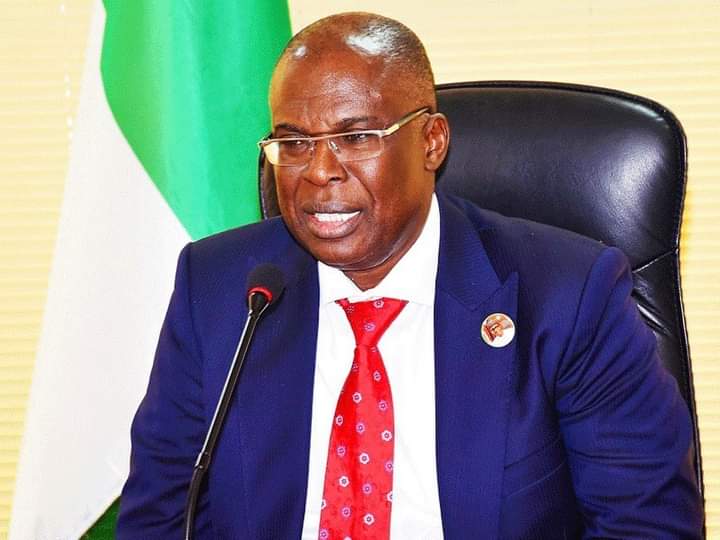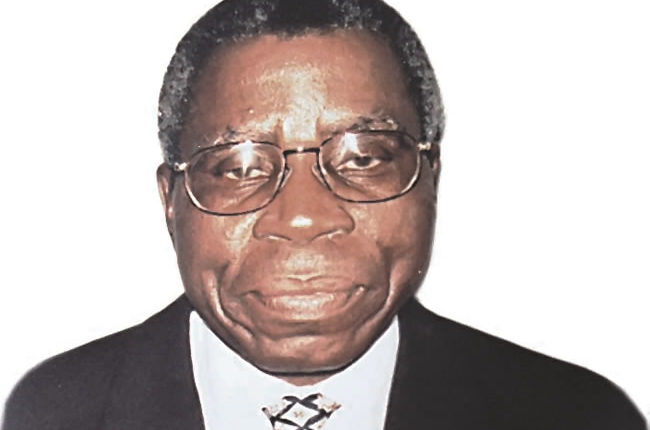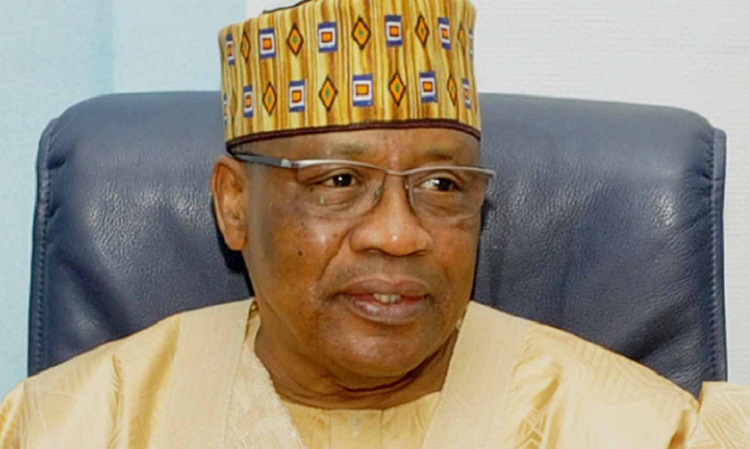By Dan Amor
“Great men, great nations, have not been boasters and buffoons, but perceivers of the terror of life and have manned themselves to face it.” – EMERSON
He is practically the only cabinet minister currently who released a New Year message to Nigerians for 2022. This symbolizes the fact that he has been anointed or programmed for a very plum job with a national emblem come 2023. Not a handful of Nigerians, except the discerning minds who could read between the lines, would appreciate the philosophy behind this ennobling move. H. E. Timipreye Marlin Sylva, former Governor of Bayelsa State and current Minister of State for Petroleum Resources is an impatient and combative man, who feels simply and cares deeply. He is a romantic and a realist, and he is also prudent, expedient, demanding and ambitious. Consequently, he decided to address Nigerians because, as a humanist, he feels their pains as a people.
A textual analysis of his brief message to Nigerians attests to this. Yet, despite the incipient degeneracy of politics in Nigeria, despite the fact that political debate or argumentation has been reduced to intrigues, backstabbing and subterfuge, and development is often seen in the dividing line between savagery and barbarism, Sylva’s New Year release to Nigerians was a soothing balm. With a combination of logic, philosophical and religious underpinnings, Sylva appealed to the spirit and inner promptings of Nigerians to love their country and hope for a better tomorrow. From his days as a member of the Rivers State House of Assembly (1992-1993), to the time he was a Special Assistant to Chief Edmund Daukoru , the then Minister of State for Petroleum under Chief Olusegun Obasanjo and when he became Governor of Bayelsa State (2008-2012), Sylva has brought uncommon insights into governance.
Yet the insights he brought to politics – insights earned in a labour of experience and self education, has led him to see power not as an end in itself but as the means of redeeming the powerless. Timi Sylva’s New Year message of hope to the common Nigerians, the desolate and the disinherited may appear common. It is more! In the message, Sylva acknowledges that his principal, President Muhammadu Buhari has tried and is still trying to extricate Nigerians from this maze of social conflicts. But the problems of the poor and downtrodden about which he cares so much remain. The passage of time, the knowledge of consequences, the illumination of hindsight, his forecast that the economy would boom, the rise of new preoccupations – all give problems of the past new form and perplexity. Nigerians have agreed to flow with this man who has seen sorrow, bewilderment, fury and fright in their faces, and has promised them hope.
Yet Sylva’s conventional religious faith, as gleaned from his release pales next to our serene inexhaustible piety. In his New Year message to Nigerians, Sylva said the citizens needed to continue to think positively of a better Nigeria, adding that the present Buhari administration would do its best to ensure that things continued to get better for the citizenry. “2022 is going to be a good year for Nigeria. Things have started shaping up and with our collective support and prayers, we will achieve the Nigeria of our dream. This is not the time to despair but to rekindle our hope of a great and prosperous Nigeria. Just like the Israelites, with God on our side, we will certainly rise from the ashes to zenith of prosperity”, Sylva said. He notes:”when the Israelites were exiled in Babylon, they kept hope alive and turned to God and God answered their prayers and they were liberated. As a people, we need to sincerely turn to God to answer our prayers and heal our land.” He is a Christian who is also invariably using his message to remind Nigerians that 2023 is the time for the country to vote a Christian to be the next president of this secular state. Anyone who says the contrary is working against natural justice and popular aspiration.
While wishing every Nigerian a prosperous 2022, the minister says: “This is going to be a great year for Nigeria in the oil and gas sector of the economy. With the Petroleum Industry Act (PIA), Nigeria has set the stage for increase investments in the sector. We now have a law that governs the sector and create confidence in the minds of potential investors and I’m confident that we will make unprecedented progress in the coming years.” Yet much of the significant critical issues in the choice of materials for the presidency as far as the All Progressives Congress (APC) is concerned would most likely be centred on the pedigrees of the aspirants. When they become candidates, the issue of which party each candidate represents does not really count much. In fact, Timi Sylva indubitably represents a bold testimony to the emerging trend of enthroning young and brilliant people at the apogee of political leadership across the world. Talking about young, good-looking, brilliant and adequately educated people in leadership positions?
There is no doubt that brains and looks appear to be the unassailable clinchers these days as far as elections are concerned. In fact, the advanced democracies of the world discovered this mystery at the dusk of the twentieth century. In the United States of America (USA), for instance, brains and looks did earn the Democratic Party a rare two-term spell under the youthful personage, then, of the ever voluble, hand-pumping and telegenic Oxford-trained lawyer, Bill Clinton. Even in Great Britain, the electorate, in May 1997, demonstrated a certain unabashed bias for yapper, dapper looks, with all the histrionic gestures and dramatic turns of phrases, when they elected Tony Blair of the New Labour, another Oxford-trained lawyer, then 43, as Prime Minister.
He was the youngest in 187 years. Consequently, the dourness of the British political landscape was dramatically but pleasurably transformed. To be candid, Blair did not only puncture, he also destroyed the veneer of cerebral vacuity and humourlessness his predecessor, John Major, had unrepentantly imposed on the British public all through his dull and trepidated reign. The all-rounded cerebral assiduity and political dazzles of Bill Clinton on the American political scene during his two-term Presidency is well known to all and sundry. And when Tony Blair was asked his priorities as leader of the New Labour, he said, number one, Education; number two, Education and number three, Education. This was when Great Britain was 500 years old as the bastion of democracy which had colonized many countries of the world.
Also, Barack Obama’s audacious political savvy as the first Black American president of the United States, is a pointer to what age and brain can do in modern political leadership. It is against this sparkling backdrop that many Nigerians got electrified or even seduced when they read Timi Sylva’s 2022 New Year message to Nigerians. Given his age (he was born in 1964) and brilliant pedigree, it is not a surprise that the rare gallantry displayed by the ebullient and hardworking minister has marked him out as one who would painstakingly work for the country and its peoples. Coming from the effeteness of a polity cast rather in a fossilized mould, the wily and deftly calculating man in his prime has assiduously and tenaciously worked his way around his mission by ensuring that he finishes clean in his area of assignment. The number of revolutionary achievements recorded in the oil and gas sector under his supervision, is second to none. The passage of the Petroleum Industry Bill into an Act of Parliament, after more than two decades in the National Assembly, is worthy of commendation.
Debonair, urbane, calm, calculative and compositely brilliant, Sylva is one of the tribunes of his generation whose political philosophy is people-centred. Like Ralph Waldo Emerson, the American essayist, lecturer, philosopher, abolitionist and poet, who led the transcendentalist movement of the mid-19th century, has said in the opening quote, great men and nations have not been boasters or buffoons, but people who appreciate the enormity of the problems of their age and position themselves strategically to proffer solutions to them. Sylva does not make a noise. But he has been studying the problems and challenges of his country and how to solve them.
Yet, when the time comes, Nigerians would ask and would be told in detail: who is Timipreye Sylva? Where is he coming from? What does he want? How do we deconstruct an alloy out of common properties? What makes Sylva so people-friendly that only a few antagonise him? The alloying of two distinct entities into a new compound requires an account of the materials used, but merely to enable the location of common properties that facilitate the making of the alloy. To attempt a critical articulation of answers to the above posers, we must eschew bitterness and primordial sentiments and probe into the personality under review. Time will tell!



